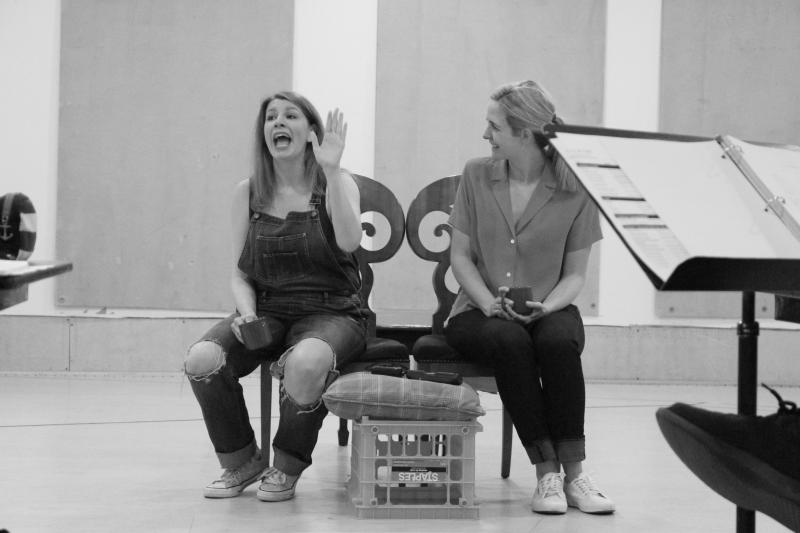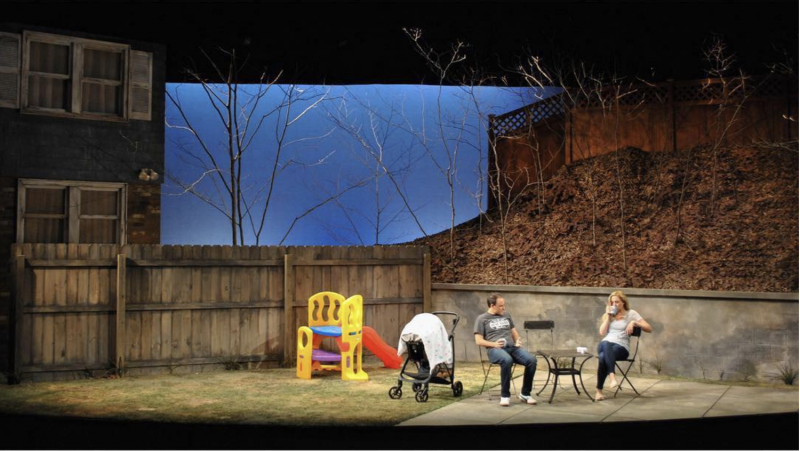Review: CRY IT OUT at Dorset Theatre Festival is NOT TO BE MISSED!

Syglowski, Janie Brookshire, Marc Masterson
The Dorset Theatre Festival 2018 season opener Cry It Out is an event many years in the making. Director Marc Masterson originally commissioned Molly Smith Metzler to write the play in 2012 when he was the artistic director of the Actors' Theater of Louisville, but she took a life detour to have a child and the final product--which draws powerfully from this experience--was not completed until 2016, at which point Masterson was no longer at ATL. The play premiered at the Kentucky theater, whose Humana Festival has long been an influential and stalwart producer of new American plays, and it has since won the American Theatre Critics Association New Play Citation. Finally director and playwright are reunited at Dorset Theatre Festival in the east coast premiere of Cry It Out.
I daresay it was worth the wait.
Metzler's play is a feat of carefully crafted character study. Over the course of the play, which runs nearly two hours without intermission, we watch two women build a friendship on the common ground of new motherhood despite their differences, particularly those of class.
The dialogue is rich, compelling and full of humor and humanity. Much of the play's action revolves around the growing friendship of Jessie and Lina, two neighbors in suburban Long Island who are navigating their new roles as mothers, grappling with the seismic reorientation of identity this apparently requires and the debilitating isolation in which this struggle occurs.
 Early in the play, Jessie (Clia Alsip) asks Lina (Andrea Syglowski) whether she plans to sleep train her baby Max by letting him cry it out. She isn't--but claims no judgement for those who do. When Jessie asks her why she has made this decision, Lina is quick to quip, "Because I don't hate babies." Okay, maybe just a little judgment.
Early in the play, Jessie (Clia Alsip) asks Lina (Andrea Syglowski) whether she plans to sleep train her baby Max by letting him cry it out. She isn't--but claims no judgement for those who do. When Jessie asks her why she has made this decision, Lina is quick to quip, "Because I don't hate babies." Okay, maybe just a little judgment.
And therein lies the crux of the matter: as working women traverse the tricky new world of motherhood, issues around identity, income, and intimacy become fully enmeshed with cultural expectations, class privilege, and gender politics. Parsing out this complexity and finding a way forward feels very nearly impossible. There appears to be no way forward that doesn't include some form of loss. Anyway you slice it, something precious gets left on the editing room floor and the new mother is forever and profoundly changed.
Not that the changes we undergo are inherently bad or good. Metzler does a decent job of uncovering--layer by heartbreaking layer--many of the angles and perspectives that impact how women ultimately make their decisions regarding work after childbirth.
Sometimes it becomes clear that the decision will be made under duress--or when a mother does claim a particular trajectory of her own volition--perhaps one that more adamantly eschews the maternal role thrust upon her, it is deemed unacceptable or even repugnantly selfish and cold. The third mother, Adrienne, played by Janie Brookshire, finds herself in this category. This draws the disapprobation of Lina and Jessie, both of whom share a warm acceptance of the messy imperfection of motherhood with fierce tenacity and humor.
This is the minefield Metzler sets up for the mothers in her play. There are no winners. And while this is not an overtly political piece of theatre, the play invites the audience into a broader conversation about what it means to be a mother in 2018 in the United States. This year marks 25 years since the Clinton-era FMLA legislation was passed that guarantees twelve weeks unpaid leave for mothers. This anemic policy puts us dead last in the world for recognizing and prioritizing support for this life transition. This is, as James Brown sings, a man's world.

Enter Mitchell, played with fantastically frenetic awkwardness by Greg Keller. Masterson claims Mitchell is the key to the whole production. And that may very well be true. He is the contrapuntal character that illuminates the particulars of the stacked deck of injustice faced by new mothers. He gives Jessie something to rail against onstage, channeling all the discontent in her marriage to Nate who, fittingly, never appears onstage.
There are precious few stories in the theater that traffic in tales of motherhood in an honest and meaningful way. This is, in part, due to the fact that there are precious few female playwrights--and even fewer who are mothers themselves.
American Theatre needs Molly Smith Metzlers. It needs scads more. And Mastersons who commission. And Janises. A profound thank you to Dina Janis for crafting a season of smart and thought-provoking plays written by women--by mothers, daughters, wives and partners. Dorset Theatre Festival is striving toward a more inclusive future, from their Women Artists Writing Group to this 41st season-opening production of Cry It Out.
See this play. Go now. Bring friends. Men, too.
Cry It Out at Dorset Theatre Festival plays June 21-July 14 at Dorset Playhouse, 104 Cheney Road, Dorset, VT 05251 $48-$58. Call 802-867-2223, ext 101, or go online to https://dorsettheatrefestival.org/
Videos
